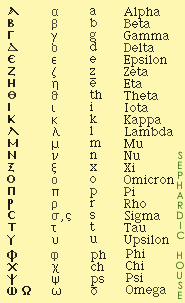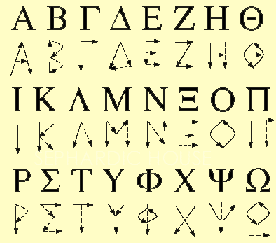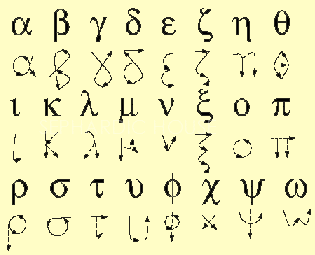
Understanding the Greek Alphabet
This is a very basic introduction, with associated links to help introduce you to the Greek language. Three accent marks are used in Greek, the acute (´), the grave (`), and the circumflex (^). In Ancient Greek they denoted a pitch accent related to the length of vowels, but in Modern Greek they serve as a stress accent. A symbol known as a rough breathing over an initial vowel represented the h sound in Ancient Greek, while the symbol for a smooth breathing over an initial vowel made clear the absence of aspiration. Though still retained today, the breathing marks no longer indicate pronunciation. In punctuation, the semicolon (;) stands for the question mark, and a raised dot denotes the semicolon and colon.
|
Latin
letter(s) used
|
Pronounced
as the bold letter combination
|
|
i
|
|
|
e
|
|
|
a
|
|
|
o
|
|
|
ou
|
|
|
b
|
|
|
d
|
|
|
g
|
|
|
z
|
|
|
th
|
|
|
k
|
|
|
l
|
|
|
m
|
|
|
n
|
|
|
ks
|
|
|
p
|
|
|
s
|
|
|
r
|
|
|
f
|
|
|
h
|
|
|
ps
|
|
Table 1. Table of Pronunciation (for English speakers)

Figure 1. Letter for Letter Comparison Table
 |
 |
Figures 2 & 3. Proper way to write modern Greek letters, upper [left] and lower [right] case.
Greek Dictionary / Font Resources